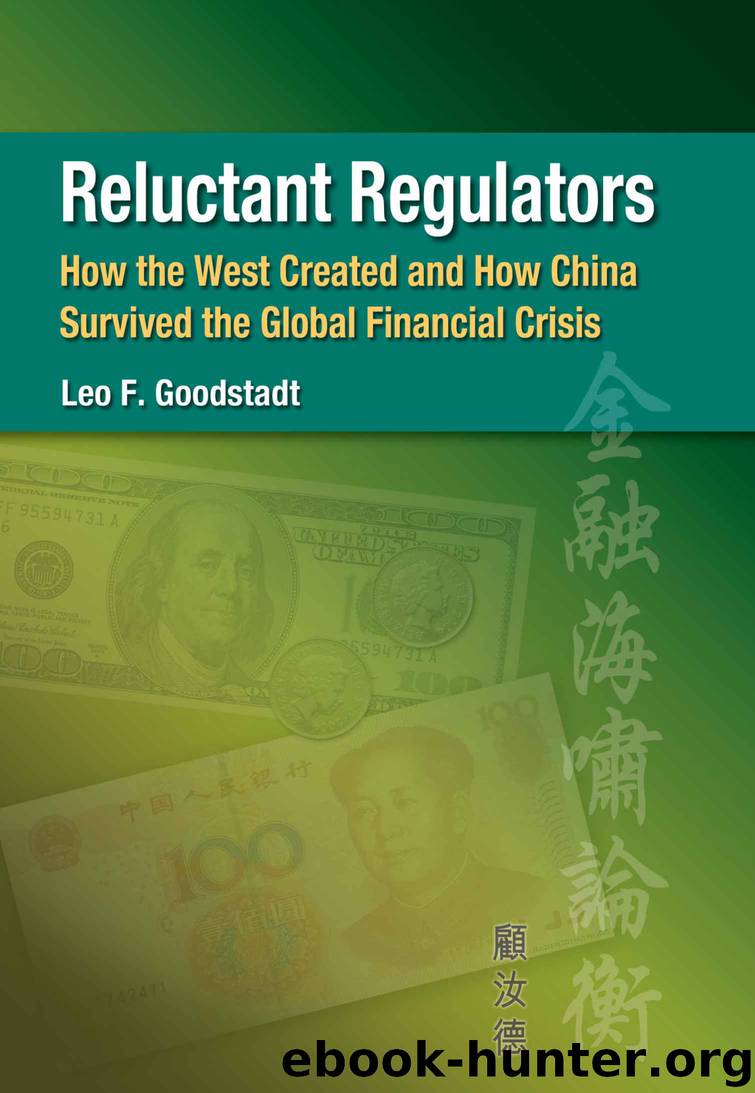Reluctant Regulators - How the West Created and How China Survived the Global Finanical Crisis by Leo F. Goodstadt

Author:Leo F. Goodstadt [Goodstadt , Leo F.]
Language: eng
Format: epub
ISBN: 9789882206489
Publisher: Hong Kong University Press
Published: 2011-03-28T16:00:00+00:00
With this anti-Keynesianism went a conviction that the Hong Kong economy was self-correcting.54 The economy was believed to adjust automatically so that markets were best left to find their own solutions to monetary shocks and to the ups and downs of the business cycle.55 During a financial crisis at the start of the 1980s, the exchange rate collapsed, and the need for more activist monetary policies seemed overwhelming. The currency was only stabilised by linking it to the United States dollar in 1983. But the ‘ideological’ bias against market involvement was so strong that officials could not bring themselves to reveal how much intervention was required to make a success of the newly-established linked exchange rate.56
Legacy of mistrust
An important factor in forming Hong Kong’s economic and financial policies was a struggle for autonomy which created very powerful disincentives against adopting the Anglo-American culture. Hong Kong had a long history of political and economic disputes first with London and later also with Washington. Hong Kong had developed its own political culture in which an absence of ‘patriotism’ and a preference for ‘political neutrality’ were defining features of its external policies.57 As early as 1935, an official Hong Kong report had stated bluntly that the colony’s interests were generally ignored or even sacrificed by London when it came to foreign trade and recommended that Hong Kong ought to be free to ignore Colonial Office economic directives and manage its own external commercial relations.58 By 1961 London had realised that ‘crudely stated’, Hong Kong’s policy was that if the United Kingdom’s textile industry ‘was going to be ruined, it might as well be at the hands of Hong Kong as those of third countries’.59
The most telling example of Hong Kong’s determination to protect its financial interests regardless of London’s instructions was its reluctance to help defend the British pound in the years when this was the overwhelming concern of the British government. Hong Kong resisted enforcing the Sterling Area’s exchange controls. This policy of insubordination was initiated discreetly by the Governor himself,60 and it was reinforced by starving London of information it needed to monitor foreign exchange flows and banking activities in the colony.61 As sterling’s crisis worsened in the 1960s, Hong Kong intensified its efforts to manage its monetary affairs independently of London.62 By the 1970s, London had been compelled to accept Hong Kong’s financial autonomy — despite its colonial status — but warned that this freedom came at a price: Hong Kong could not depend on the United Kingdom to come to its rescue in any future crisis.63
Relations with Washington were always going to be strained because of American protectionist policies. The United States, like other developed countries, tended ‘to discriminate against finished products from simple, labour-intensive industries and in favour of trade in raw materials and semi-processed natural resources’, with Hong Kong as a major target.64 Washington’s demands for the right to police export controls on the ground in Hong Kong also created friction, as did disputes over intellectual property rights.65 After
Download
This site does not store any files on its server. We only index and link to content provided by other sites. Please contact the content providers to delete copyright contents if any and email us, we'll remove relevant links or contents immediately.
International Integration of the Brazilian Economy by Elias C. Grivoyannis(106932)
The Radium Girls by Kate Moore(12003)
Turbulence by E. J. Noyes(8008)
Nudge - Improving Decisions about Health, Wealth, and Happiness by Thaler Sunstein(7678)
The Black Swan by Nassim Nicholas Taleb(7088)
Rich Dad Poor Dad by Robert T. Kiyosaki(6578)
Pioneering Portfolio Management by David F. Swensen(6275)
Man-made Catastrophes and Risk Information Concealment by Dmitry Chernov & Didier Sornette(5981)
Zero to One by Peter Thiel(5768)
Secrecy World by Jake Bernstein(4727)
Millionaire: The Philanderer, Gambler, and Duelist Who Invented Modern Finance by Janet Gleeson(4448)
The Age of Surveillance Capitalism by Shoshana Zuboff(4267)
Skin in the Game by Nassim Nicholas Taleb(4224)
The Money Culture by Michael Lewis(4174)
Bullshit Jobs by David Graeber(4162)
Skin in the Game: Hidden Asymmetries in Daily Life by Nassim Nicholas Taleb(3977)
The Dhandho Investor by Mohnish Pabrai(3744)
The Wisdom of Finance by Mihir Desai(3720)
Blockchain Basics by Daniel Drescher(3566)
